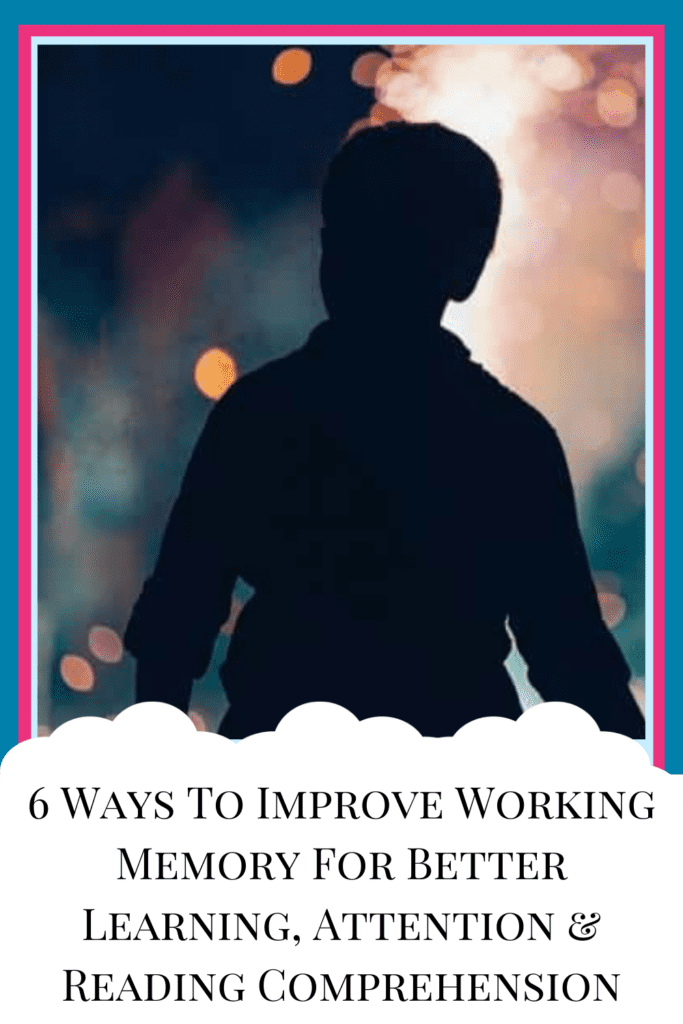If you read my article how how poor working memory can affect reading comprehension, the ability to decode words and even read fluently, it’s time to address what can be done to change that. The first step is to make it clear to your child that difficulty decoding or reading has little to with IQ. Many of these children are of above average intelligence and may have an excellent long-term memory. This can make it seem even more convincing that they are simply choosing to not pay attention.
When working memory improves””children can shift from struggling students to experiencing school success. Working memory can be weak if certain developmental milestones were skipped in the first year of life and there is incomplete development of the lower brain levels. Some children simply have a weak working memory because it is not practiced.
Teachers are noting that children today are less able to remember than ever before as curriculum expectations are requiring less memorization. While it is true that we live in the age of information and needing to remember information is not as useful as the past””working memory needs to be exercised in order for the brain to complete countless other cognitive tasks.
Even children and adults without reading or learning difficulties have a reduced ability to memorize today because we no longer need to rely on our memory with the countless technological inventions, APPS and information that is so easily accessible. If individuals without learning difficulties have a weaker memory today, imagine how much more difficult it must be for a child who not only has a learning disability or challenge, but is also given little opportunity to memorize both at home or at school.
In the past, everyone was required to memorize in order to perform daily tasks. Everything from recipes, gardening rules, knitting patterns, prayers, phone numbers, directions, instructions, words or notes to a song and much more had to be committed to memory. Today, virtually all of this same information is at our fingertips””literally.
Keep in mind, however that if lower brain levels are weak due to skipped milestones in the first year of life or if there are nutritional deficiencies, imbalances or undiagnosed food sensitivities then usually an intervention that addresses this specifically is required.
Providing information in a manner in which movement or other senses are engaged makes it easier for the brain to retain information. Something as simple as having your child throw a ball back and forth while reciting facts, or doing trivia questions or having to stand up when the answer is correct and sit down when the answer false is another way to optimize retention.
Whether your child has a learning disorder or is simply struggling as a learner, making a point to have your child memorize is the starting point in developing a strong working memory. I don’t advise telling your child who already hates school and has a poor relationship to learning to memorize something they consider boring.
Depending on your child’s age, start with something like nursery rhymes or if they are older””lyrics to a song. If they are learning an instrument, encourage them to learn a song by heart. Every child should know their phone number and address not only for the development of good working memory but also for safety reasons.
Teaching your child to memorize poems, prayers, a list of facts (like all the provinces or states and their capitals) as well as their timetables can all assist in strengthening their memory and teaching them tricks to better remember. You see the thing about memory is that the more you use it, and the more you learn””the easier it is to memorize. I used to work with students who were English language learners””many of my students were learning third and fourth languages and picked up each new language more easily than the last because they had developed a whole different skill set in HOW to memorize.
There are various ways to improve auditory working memory””the key is to get your child used to absorbing information through oral communication. Some children have a strong visual working memory but when they have to rely solely on their auditory working memory then breakdown starts to occur. These are the kids who have a hard time remembering instructions at school or at home and when a story is read to them aloud they have difficulty telling you what took place.
Even a person with a strong working memory will not likely be able to remember more than a list of 7 items without practice. A person with a weak memory cannot usually recall a list of more than three””so start small and increase the number of items in a list as your child improves.
Any activity or game that requires your child to listen to a short set of instructions and then either repeat it back, seek out those items or do some other kind of activity from those oral instructions helps to develop their auditory working memory. When children were young we did this with such games as ‘Simon Says’.
Below is a list of ways you can help them at home:
1) Tune-In to Sounds – Start by having your child simply tune into the sounds around them. Have them listen to the sounds in their backyard and really pay attention to all of the different sounds around them. Next have them focus on one particular sound, while tuning the other distractions out (like listening to the chirping of birds, the hum of cars going by, the rustling wind in the leaves.)
2) Read-Aloud – Read out loud to your child and listen to books on tape. This allows your child to take in a story through hearing without doing any other work. Ask them after every few sentences what is going on in the story or text.
3) Repeat-After-Me – Give your child multiple instructions and see if they can repeat back what you just said. For example, ‘to make a sandwich start with two slices of bread, then add butter, mayonnaise and then lunch meat and a tomato’. Other lists of instructions could be such things as ‘sit down, cross your legs ad clap four times’.
4) Obstacle Courses – Have your child remember a series of instructions to get a reward: jump over the cord, creep under the table and crawl through the hallway. Increase the number of instructions they have to follow as they improve.
5) Scavengers – Provide children with a list of three items they must obtain from around the house and bring back to you in order to ‘win’ a prize. The more random you make the objects the more challenging it will be so start off with objects that are more alike and in the same room to start. As they improve increase the number of items that they must bring back to you.
6) Listamania – Repeat a list of items starting with as little as three items and then increase to seven. Start with related items if just starting out and random items as they progress. After you have said them aloud, have them repeat it back to you. Once they become more skilled””ask them to repeat the items backwards. Lists could include animals, provinces, countries, foods, clothes, colours, games, holidays etc.
To learn more about how you can improve your child’s ability to learn, focus and be a happier kid, schedule a free 20 minute Star Student Breakthrough session and I will help you identify three possible roadblocks to your child’s success and the number one change you can make today to help your child on the path to success.



One thought on “6 Ways to Improve Working Memory for Better Learning, Attention & Reading Comprehension”